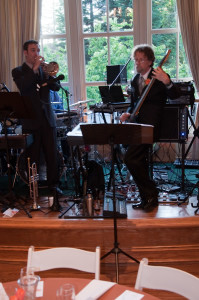
Back in the dark ages, perhaps when movies did not have sound and all things were black and white, and the Internet was still young – and even (gasp) before I had written the Bassist’s Bible I had a series of Jazz gigs coming up and I was scared to death. We would be using charts out of the Real Books and playing with some Pro’s who knew those tunes well. And if you know those books you would also know that there are rarely bass parts in those charts. You walk – meaning you create endless bass lines on the fly that are different in every single measure yet still keep things swinging along all night long, song after song. Gak. How many ideas are actually in my head? Won’t they run out? Will my fingers fall off from too many quarter notes?
I could ‘fake’ walking – mostly by playing a triad using the appropriate (I hoped) third and seventh and a lot of roots and fifths. I think I probably changed up the rhythm a lot (not a good thing) with some syncopation as I would get bored. I did not really understand how leading tones suggested the upcoming chords or how “standard” many Jazz chord progressions are. I had taken a few lessons with Dave Belove, a local bassist who plays Afro-Cuban Jazz and was our main contributor for the Afro-Cuban chapter of my book. He helped me to understand the basics but I still had zero confidence and had these Jazz gigs coming up – one of them a wedding. Shoot me now! Ok. Maybe not, I needed the money.
If I had had The Bassist’s Bible completed I would not have been worried. Seriously. This is one of the main reasons I wrote it. If I had my book I could turn to the Jazz Chapter, look at the examples, listen to some of the audio or look at the video. I could familiarize myself with famous jazz bassists and check the discography and maybe listen to those tracks on Youtube. (In those days – no youtube. Remember we had silent films a few years ago right?) I could look at chord progressions, and there are helpful suggestions about note choices and rhythm choices. I could even learn a little about the History of Jazz so I could fill in the holes of my many decades of listening but not playing Jazz music – (where I thought I knew something but really could not re-create it.)
My eternally optimistic drummer (and co-author) Mick kept saying “It’ll be a piece of cake.” as we worked, most Thursdays, in my studio – just drums and bass for weeks before the gig. I clearly remember as one of the horn players and the keyboard player showed up (and while taking a look at the bassist with his obviously Rock ‘n’Roll Kubicki bass and amp) said to the other horn player “Do you know these guys ?” (meaning Mick and I) The answer: “No.” Then “I don’t think this is a real band …” Needless to say this did not help my confidence at all.
We managed to get through the gig, and as it was a wedding no one in the audience had any idea I was faking it, repeating lines instead of varying them, playing fourths, the occasional inappropriate major third or seventh and mostly missing the diminished fifth’s as they flew by in the chart and freaked me out. I could not read fast enough! Since it was a wedding reception, people were more involved in chatting up the bride, drinking and looking for future dance partners than listening to my bass lines. It turned out to be really fun and I wanted to play more Jazz. I also got over my fear of playing “Serious” music. I did get some serious smiles and compliments from the horn players and keyboard player and indeed saw them at later gigs. Whew.
Years later, while writing the book, and after a lot of correspondence via email I heard that Ron Carter, esteemed bassist for about everyone on earth including Miles Davis, agreed to look at my Jazz chapter. I think the version he saw had the charts set up with a horrible version of Blues chord markings, a few “Suggestions” or perhaps “Rules” about walking and a lot of examples and a huge amount of history. One day I was literally up in a tree in my back yard, about to turn on the chain saw when the phone rang. I jumped down, answered it and it was Ron Carter. Oh my God! Grab a pen and paper and sit down! He was so incredibly helpful, soft spoken, and human about my flawed manuscript. He would say things like (on the chords) “You might want to add more specificity here” or looking at my “Rules” “You might not want to be quite so specific here, maybe you should call them Suggestions.” He had probably looked at (and perhaps played) each example and probably read most of it as he had very detailed comments on the actual music as well. At the end of our conversation, he could tell I was a bit overwhelmed just to talk to him and as he said “Good Bye” he also said “Enjoy the Moment!” Indeed I did.
I would not say that I am, yet, a strong Jazz bassist, especially as I know some really heavy players, but at least the fear is gone. And once you start getting out there, doing your best, you might find you can take that gig, have some fun, learn something new, and most likely, unless you are playing Yoshi’s, no one will even notice that you might be struggling a bit in the process.



